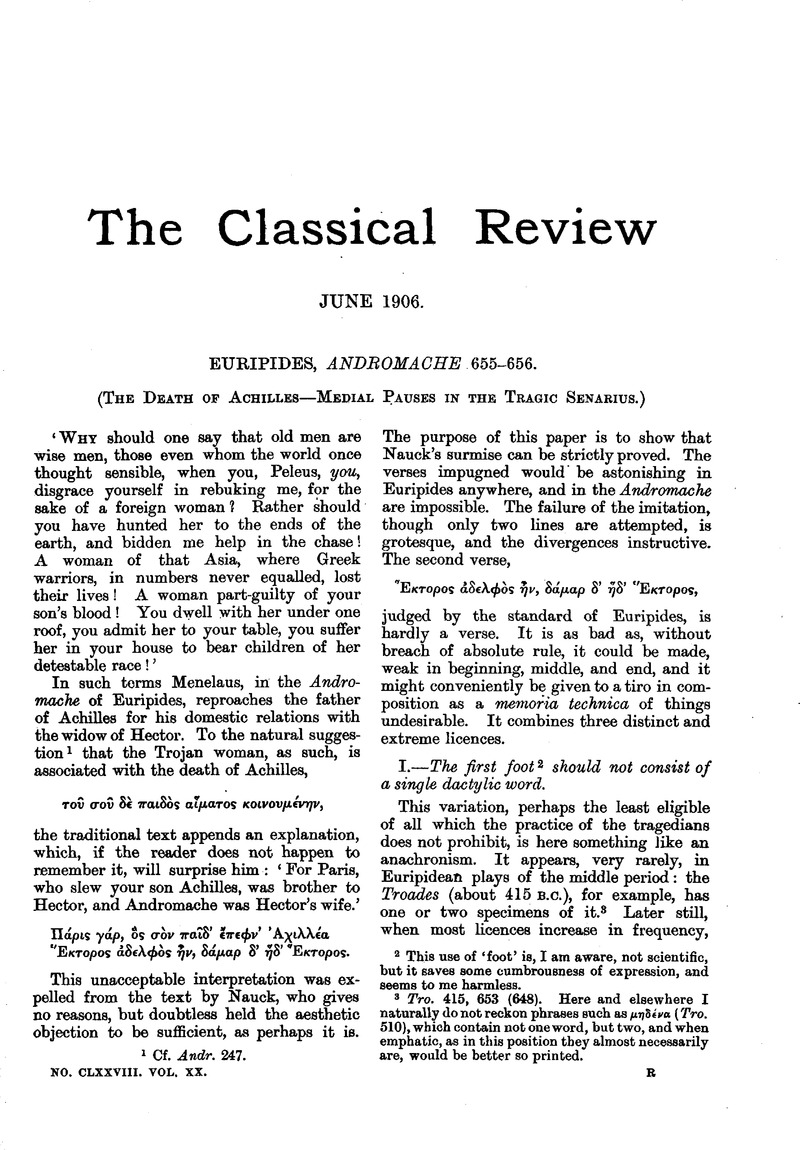No CrossRef data available.
Article contents
Euripides, Andromache 655–656
Published online by Cambridge University Press: 27 October 2009
Abstract

- Type
- Original Contributions
- Information
- Copyright
- Copyright © The Classical Association 1906
References
page 241 note 1 Cf. Andr. 247.
page 241 note 2 This use of ‘foot’ is, I am aware, not scientific, but it saves some cumbrousness of expression, and seems to me harmless.
page 241 note 3 Tro. 415, 653 (648). Here and elsewhere I naturally do not reckon phrases such as μηδνα (Tro. 510), which contain not one word, but two, and when emphatic, as in this position they almost necessarily are, would be better so printed.
page 242 note 1 A proper name, such as Ἕκτορος, would be the most likely occasion for the licence; but in fact, down to the Hecuba (inclusive), it does not occur, so far as I have observed. It might, no doubt, have occurred in the Andromache or anywhere; but that is not the point.
page 242 note 2 Andr. 169 (οὐ Πραμος), 387, 1157, 1214, 1266.
page 242 note 3 Such verses as ![]() with an elision between the third foot and the fourth, do not fall within the scope of our consideration, the pause not being strictly medial. They have, ‘virtually’ as the phrase is, a caesura in the fourth foot. They are more common than those without elision; the use of them, I believe, to be similar though distinguishable. However they do not concern us at present.
with an elision between the third foot and the fourth, do not fall within the scope of our consideration, the pause not being strictly medial. They have, ‘virtually’ as the phrase is, a caesura in the fourth foot. They are more common than those without elision; the use of them, I believe, to be similar though distinguishable. However they do not concern us at present.
page 243 note 1 I ignore, here and elsewhere, cases (such as Heracles 8, Hecuba 398) where, though we may put a comma, we cannot say that there is any break of sense, and, a fortiori, cases such as Andr. 698, where not even a comma is required. My lists are fairly full, but completeness is not necessary for the present purpose, and it is probable that some instances have been overlooked. Indeed completeness is scarcely possible, where in delicate cases there must be room for difference of judgment and estimate.
page 244 note 1 In Tro. 386 I do not find any pause. In Hecuba 979 I should prefer to punctuate before, not after, σος, though it the other punctuation be preferred, the emphasis thus put on σος can be justified. In Hecuba 321 it is possible that the comma should follow, not precede, τδε.
page 244 note 2 Contrast the calculated and excellent effect of a similar flatness, followed by change of tone, in Sophocles Phil. 435. For the general practice of Sophocles, which is similar to that of Euripides, but I think rather less strict, see Phil. 57, 297, 366, 389, 503, 589, 907, 1009, 1021, 1049, 1237, 1302.
page 244 note 3 ![]() MSS.
MSS.
page 244 note 4 In Andr. 929 ![]() , a medial punctuation, very strange and peculiar, is produced by the conjecture
, a medial punctuation, very strange and peculiar, is produced by the conjecture ![]() which for this and other reasons is to be rejected. As I have said elsewhere (note ad loc. in Appendix to my essay on this play, in Four Essays etc.), I believe the archaic optative without ᾄν to be, in such a traditional formula as. ὡς εἴποι τις, admissible and natural.
which for this and other reasons is to be rejected. As I have said elsewhere (note ad loc. in Appendix to my essay on this play, in Four Essays etc.), I believe the archaic optative without ᾄν to be, in such a traditional formula as. ὡς εἴποι τις, admissible and natural.
page 245 note 1 ![]() (Dindorf), which modifies the medial punctuation by an elision. The whole passage (1575–1594) is poor and of doubtful authority.
(Dindorf), which modifies the medial punctuation by an elision. The whole passage (1575–1594) is poor and of doubtful authority.
page 245 note 2 See Andr. 367, 378, 460, 640, 680, 750, 905, 975, 979, 1081. In ib. 875 there is no ‘cretic pause’: the scansion intended is ![]() , the preposition being treated as separable. In ib. 230
, the preposition being treated as separable. In ib. 230 ![]() , the rule is violently broken, and we must either correct (δ Pierson) or suppose an intention, a sharp and intentionally disagreeable emphasis on τν κακν. I prefer the second alternative.
, the rule is violently broken, and we must either correct (δ Pierson) or suppose an intention, a sharp and intentionally disagreeable emphasis on τν κακν. I prefer the second alternative.
page 245 note 3 That this means αὐτν, Άχιλλα, opposed to Άχιλλως παῖς, is in my opinion certain. The words cannot be otherwise translated. The attempts to improve the passage (by omitting ![]() and otherwise) proceed upon the mistaken assumption that αὐτν must mean Neoptolemus.
and otherwise) proceed upon the mistaken assumption that αὐτν must mean Neoptolemus.




